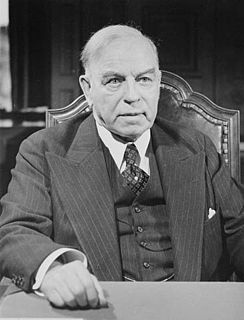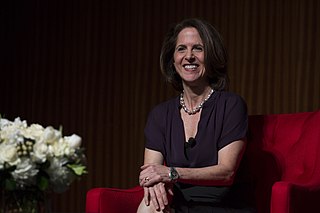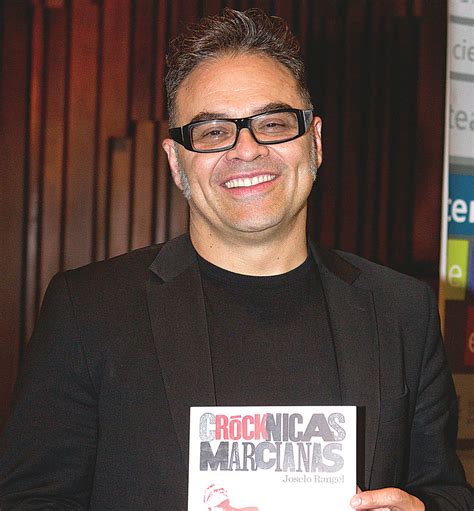A Quote by William Lyon Mackenzie King
I believed the people had a true instinct in most matters of government when left alone. That they were not swayed, as specially favoured individuals were, by personal interest, but rather by a sense of what best served the common good. That they recognized the truth when it was put before them, and that a leader can guide so long as he kept to the right lines. I did not think it was a mark of leadership to try to make the people do what one wanted them to do.
Quote Topics
Related Quotes
If you want to be a great leader, you have to put the interest of the country above your own. I would like to think that true leadership is not just telling people what they want to hear but helping them understand things, so you can explain to them what you think is best, and then they can judge you on that.
There were the days when women were under contract, and they were thought of as a commodity, so they hired the best writers and a lot of them were women at the time. This was in the thirties and forties, to make product for the people who were under contract, who were their assets to the studios. But that doesn't exist anymore - and as a result, the people who are in the industry write products that interest them.
It's true that I don't think I'd be a good director. If I were a director, I'd try to hire the best people I could and then leave them alone. I don't know much about cameras or lighting, so I'd make sure that I had a really good cameraman who understood lenses and lighting, and I say to him, "This is the scene we have to shoot and this is what I think it should be, you go do it." Same with actors. But really, very good directors who know everything do basically the same thing. They hire you and then they leave you alone.
Well it did not make excessive sense to say that 20 million people are the recognized government of a billion people that have their own institutions. We did not change it in the sense that we said this has to end, but there was a U.N. vote that transferred the legitimacy of China from Taiwan to Beijing. Beijing was recognized as the government of all of China. Then, under President Carter, we followed what the U.N. had already done eight years earlier.
We spent as much money as we could and got as little for it as people could make up their minds to give us. We were always more or less miserable, and most of our acquaintance were in the same condition. There was a gay fiction among us that we were constantly enjoying ourselves, and a skeleton truth that we never did. To the best of my belief, our case was in the last aspect a rather common one.
In the middle of this it was good to have some moments in which whatever was left of you could sit in silence. When you could remember. When the evidence that had gathered could be sorted. And it was a difficulty if another person imagined these moments were their property. Your life got sliced from two sides like a supermarket salami until there was nothing left in the middle. You were the bits that had been given away right and left to others. Because they wanted the piece of you that belonged to them. Because they wanted more. Because they wanted passion. And you did not have it.
I suppose we'll make money off our album and our singles and stuff, but, like, they were made as we wanted them, exactly with what we had to say, and done exactly how we wanted them, right? And, like, we didn't put them out to make money. We put them out because we wanted to do them, do you know what I mean?
Leader and followers are both following the invisible leader - the common purpose. The best executives put this common purpose clearly before their group. While leadership depends on depth of conviction and the power coming therefrom there must also be the ability to share that conviction with others, the ability to make purpose articulate. And then that common purpose becomes the leader.
I think the folks who joined Jim Jones's church did so because they truly believed in his stated ideals of racial equality and social justice. That's why he was able to convince one thousand of them to immigrate to the jungle of Guyana. Although history has stigmatized Jonestown residents as the people who "drank the Kool-aid," I'd argue that they were noble idealists. Furthermore, they were murdered. They didn't willingly drink poison - they were forced to do so at gunpoint. They sought the ideal, only to have their leader horribly betray them.
Grandmother pointed out my brother Perry, my sister Sarah, and my sister Eliza, who stood in the group. I had never seen my brother nor my sisters before; and, though I had sometimes heard of them, and felt a curious interest in them, I really did not understand what they were to me, or I to them. We were brothers and sisters, but what of that? Why should they be attached to me, or I to them? Brothers and sisters were by blood; but slavery had made us strangers. I heard the words brother and sisters, and knew they must mean something; but slavery had robbed these terms of their true meaning.
Perhaps the bands emerging nowadays don't have the right context around them to help them grow. We were born at the right moment where everything was happening. There was a great interest for rock en español and it was everywhere. The audience, labels and the media were all interested; everything was there. We wanted to present music that was very personal to us, and it continues being that way.

































